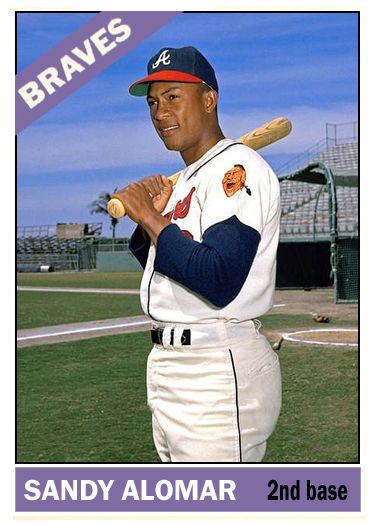rico43
<B>Director of Minor League Reports</B>
#16 SANDY ALOMAR
Infielder
What came before: A slick-fielding Puerto Rican shortstop, he turned pro at age 17. Piling up lots of minor league at-bats, he was a young veteran of 20 when he broke into the majors in September of 1964.

But despite his versatility, he was treated like a spare part, left in the minors until needed. He played in only 64 games in 1965, but stole 12 basees, which should have drawn some notice because of baseball's growing need for speed.
That 1966 season: He was only called on to play defense for 26 games all season and delivered defense, making only one error. But at the plate, he was a dismal 4-for-44 (.091) were a mere two RBIs. In Triple-A, he had plenty of at-bats, but only managed a .243 average for the second straight season. The Braves had seen enough. With the housecleaning well under way, just before camp opened for the 1967 season, he was the plaleyr to be named later in the deal that sent Eddie Mathews and Dan Schneider to the Astros for Bob Bruce and Dave Nicholson.
In June, his son, Sandy Alomar Jr. was born. A catcher, he went on to be a five-time all-star and play 20 seasons in the majors.
What happened next: By 1968, he was in the majors to stay, and he finally landed a starting job in 1969 with the California Angels. In 1970-71, he had an astounding 730 plate appearances both seasons and hit .300 both years. In 1970, he was an AL All-Star. But by 1974, he lost that job and was dealt away to the Yankees, where he returned to the late-inning defense role. Moving to the Rangers, his 15-year playing career ended in 1978.
His greatest achievement came in 1968, when son Roberto was born in Puerto Rico. He was a 12-time all-star in his 17 seasons and was named to the Baseball Hall of Fame in 2013.
Infielder
What came before: A slick-fielding Puerto Rican shortstop, he turned pro at age 17. Piling up lots of minor league at-bats, he was a young veteran of 20 when he broke into the majors in September of 1964.

But despite his versatility, he was treated like a spare part, left in the minors until needed. He played in only 64 games in 1965, but stole 12 basees, which should have drawn some notice because of baseball's growing need for speed.
That 1966 season: He was only called on to play defense for 26 games all season and delivered defense, making only one error. But at the plate, he was a dismal 4-for-44 (.091) were a mere two RBIs. In Triple-A, he had plenty of at-bats, but only managed a .243 average for the second straight season. The Braves had seen enough. With the housecleaning well under way, just before camp opened for the 1967 season, he was the plaleyr to be named later in the deal that sent Eddie Mathews and Dan Schneider to the Astros for Bob Bruce and Dave Nicholson.
In June, his son, Sandy Alomar Jr. was born. A catcher, he went on to be a five-time all-star and play 20 seasons in the majors.
What happened next: By 1968, he was in the majors to stay, and he finally landed a starting job in 1969 with the California Angels. In 1970-71, he had an astounding 730 plate appearances both seasons and hit .300 both years. In 1970, he was an AL All-Star. But by 1974, he lost that job and was dealt away to the Yankees, where he returned to the late-inning defense role. Moving to the Rangers, his 15-year playing career ended in 1978.
His greatest achievement came in 1968, when son Roberto was born in Puerto Rico. He was a 12-time all-star in his 17 seasons and was named to the Baseball Hall of Fame in 2013.
